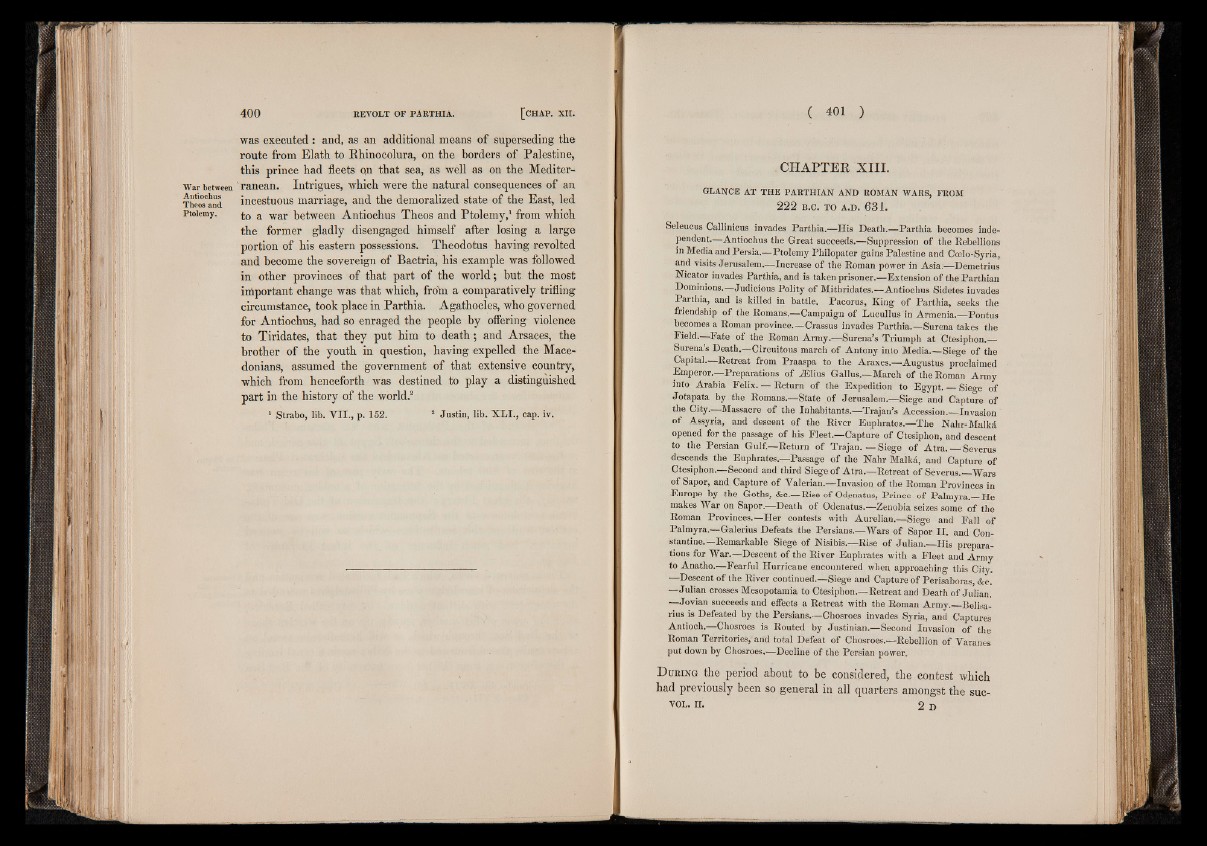
was executed: and, as an additional means of superseding the
route from Elath to Rhinocolura, on the borders of Palestine,
this prince had fleets qn that sea, as well as on the Mediter-
War between ranean. Intrigues, which were the natural consequences of an
Theosand incestuous marriage, and the demoralized state of the East, led
Ptolemy. £0 a war between Antiochus Theos and Ptolemy,* from which
the former gladly disengaged himself after losing a large
portion of his eastern possessions. Theodotus having revolted
and become the sovereign of Bactria, his example was followed
in other provinces of that part of the world; but the most
important change was that which, from a comparatively trifling
circumstance, took place in Parthia. Agathocles, who governed
for Antiochus, had so enraged the people by offering violence
to Tiridates, that they put him to death; and Arsaces, the
brother of the youth in question, having expelled the Macedonians,
assumed the government of that extensive country,
which from henceforth was destined to play a distinguished
part in the history of the world.2
* Strabo, lib. V I I ., p. 152. ! Justin, lib. X L I ., cap. iv.
I
CHAPTER XIII.
GLANCE AT THE PARTHIAN AND ROMAN WARS, FROM
222 B.C. TO A.D. 631.
Seleucus Callinicus invades Parthia.—His Death.—Parthia becomes independent.—
Antiochus the Great succeeds.—Suppression of the Rebellions
in Media and Persia.—Ptolemy Philopater gains Palestine and Ccelo-Syria,
and visits Jerusalem.-i^Increase of the Roman power in Asia.—Demetrius
Nicator invades Parthia, and is taken prisoner.—Extension o f the Parthian
Dominions.—Judicious Polity of Mithridates.—Antiochus Sidetes invades
Parthia, and is killed in battle. Pacorus, King o f Parthia, seeks the
friendship of the Romans.—Campaign of Lucullus in Armenia.—Pontus
becomes a Roman province.—Crassus invades Parthia.—Surena takes the
Field. Fate of the Roman Army.—Surena’s Triumph a t Ctesiphon.—
Surena’s Death.—Circuitous march of Antony into Media.—Siege o f the
Capital.—Retreat from Praaspa to the Araxes.—Augustus proclaimed
Emperor.—Preparations of JElius Gallus.—March of the Roman Army
into Arabia Felix.; — Return o f the Expedition to Egypt. — Siege of
Jotapata by the Romans.—State of Jerusalem.—Siege and Capture of
the City.—Massacre o f the Inhabitants.—Trajan’s Accession.—Invasion
o f Assyria, and descent of the River Euphrates.—The Nahr-Malkà
opened for the passage o f his F le e t—Capture of Ctesiphon, and descent
to the Persian Gulf.—Return of Trajan. — Siege of Atra. — Severus
descends the Euphrates.—Passage of the Nahr Malkà, and Capture of
Ctesiphon.—Second and third Siege of Atra.—Retreat of Severus.- Wars
of Sapor, and Capture of Valerian.^—Invasion of the Roman Provinces in
Europe by the Goths, &c.—Rise of Odenatus, Prince of Palmyra. He
makes W ar on Sapor.—Death o f Odenatus.—Zenobia seizes some o f the
Roman Provinces.—Her contests with Aurelian.—Siege and Fa ll of
Palmyra.—Galerius Defeats the Persians.—Wars of Sapor I I . and Constantine,—
Remarkable Siege of Nisi bis.—Rise of Julian.—His preparations
for War.—Descent of the River Euphrates with a Fleet and Army
to Anatho.—Fearful Hurricane encountered when approaching this City.
—Descent of the River continued.—Siege and Capture o f Perisaboras, &e.
—Julian crosses Mesopotamia to Ctesiphon.—Retreat and Death of Julian.
—Jovian succeeds and effects a Retreat with the Roman Army. Belisarius
is Defeated by the Persians.—Chosroes invades Syria, and Capture's
Antioch.—Chosroes is Routed by Justinian.—Second Invasion of the
Roman Territories, and total Defeat of Chosroes.—Rebellion of Varanes
put down by Chosroes.—Decline of the Persian power.
D o b in g t h e p e r io d a b o u t to b e c o n s id e r e d , t h e c o n t e s t w h i c h
h a d p r e v io u s ly b e e n so g e n e r a l i n a l l q u a r t e r s a m o n g s t t h e s u c -
VOL. II. 2 I)